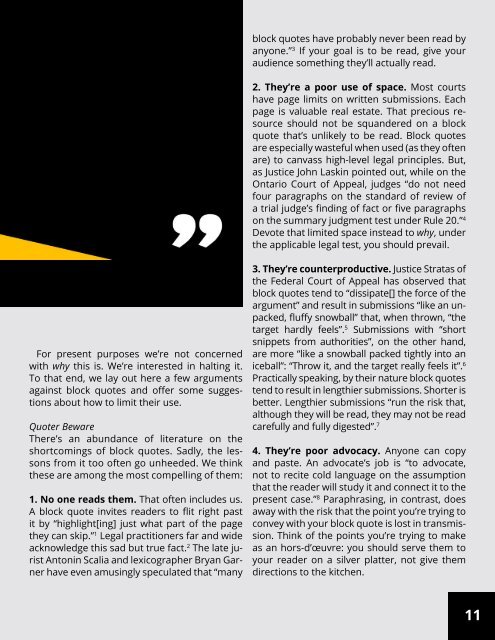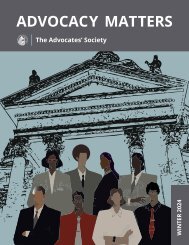Keeping Tabs - Fall 2021
Stay up-to-date on news and events from our Young Advocates' Standing Committee (YASC) with Keeping Tabs.
Stay up-to-date on news and events from our Young Advocates' Standing Committee (YASC) with Keeping Tabs.
Create successful ePaper yourself
Turn your PDF publications into a flip-book with our unique Google optimized e-Paper software.
lock quotes have probably never been read by<br />
anyone.” 3 If your goal is to be read, give your<br />
audience something they’ll actually read.<br />
2. They’re a poor use of space. Most courts<br />
have page limits on written submissions. Each<br />
page is valuable real estate. That precious resource<br />
should not be squandered on a block<br />
quote that’s unlikely to be read. Block quotes<br />
are especially wasteful when used (as they often<br />
are) to canvass high-level legal principles. But,<br />
as Justice John Laskin pointed out, while on the<br />
Ontario Court of Appeal, judges “do not need<br />
four paragraphs on the standard of review of<br />
a trial judge’s finding of fact or five paragraphs<br />
on the summary judgment test under Rule 20.” 4<br />
Devote that limited space instead to why, under<br />
the applicable legal test, you should prevail.<br />
For present purposes we’re not concerned<br />
with why this is. We’re interested in halting it.<br />
To that end, we lay out here a few arguments<br />
against block quotes and offer some suggestions<br />
about how to limit their use.<br />
Quoter Beware<br />
There’s an abundance of literature on the<br />
shortcomings of block quotes. Sadly, the lessons<br />
from it too often go unheeded. We think<br />
these are among the most compelling of them:<br />
1. No one reads them. That often includes us.<br />
A block quote invites readers to flit right past<br />
it by “highlight[ing] just what part of the page<br />
they can skip.” 1 Legal practitioners far and wide<br />
acknowledge this sad but true fact. 2 The late jurist<br />
Antonin Scalia and lexicographer Bryan Garner<br />
have even amusingly speculated that “many<br />
3. They’re counterproductive. Justice Stratas of<br />
the Federal Court of Appeal has observed that<br />
block quotes tend to “dissipate[] the force of the<br />
argument” and result in submissions “like an unpacked,<br />
fluffy snowball” that, when thrown, “the<br />
target hardly feels”. 5 Submissions with “short<br />
snippets from authorities”, on the other hand,<br />
are more “like a snowball packed tightly into an<br />
iceball”: “Throw it, and the target really feels it”. 6<br />
Practically speaking, by their nature block quotes<br />
tend to result in lengthier submissions. Shorter is<br />
better. Lengthier submissions “run the risk that,<br />
although they will be read, they may not be read<br />
carefully and fully digested”. 7<br />
4. They’re poor advocacy. Anyone can copy<br />
and paste. An advocate’s job is “to advocate,<br />
not to recite cold language on the assumption<br />
that the reader will study it and connect it to the<br />
present case.” 8 Paraphrasing, in contrast, does<br />
away with the risk that the point you’re trying to<br />
convey with your block quote is lost in transmission.<br />
Think of the points you’re trying to make<br />
as an hors-d’œuvre: you should serve them to<br />
your reader on a silver platter, not give them<br />
directions to the kitchen.<br />
11


















